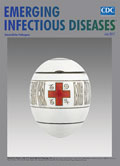
Volume 23, Number 7—July 2017
Another Dimension
The Summer of Seventy-Six—Legionella pneumophila Monologue
On This Page
The scientific community has understood that the microbes around and within us are the driving force of our life (1). However, the next generation is being brought up with a fear of encountering microorganisms. This generation has developed a deeply rooted view that all microorganisms are dangerous. Moreover, anthropocentric investigations have created an unrealistic view of the microorganisms in nature (2). Only a negligible percentage of the known microorganisms cause disease in humans, and we have created a mess in handling them.
We believe that the perspective of the next generation toward microorganisms should be changed. Activities involving creation of bacterial monologues (to think from microbes’ perspective) have been shown to enhance the conceptual understanding of key topics in microbiology and improvement in the attitude of students toward science (3). Use of such methods would inculcate the right interest among the next generation and teach them to respect nature.
We present a poem called The Summer of Seventy-Six, which deliberates about the pathogen turned environmental bacterium Legionella pneumophila, by walking in its shoes.
Learning my native dance, I
Enjoyed the filmy cover, until you
Gave me a chance to
Invade an unclean tower.
On the summer of seventy-six, I got a
Name, only to sing some veterans’ fame,
Every corner I took the blame,
Like you never played the vexing game.
Little aerosols made the incident and your
Ailing was a mere accident.
Protozoans are my natural host,
Naegleria makes a happy toast.
Even in hot springs I can thrive,
Under the soil I can jive.
Macrophages are my motel room,
On my way I make them bloom,
Prevention stops the moody gloom,
Hauling me before the boom.
In a way I am a pathogen, popping your
Lungs’ oxygen, but you clearly know, I am
Affected by heat, copper, and a halogen.
Human-made modifications of nature are the cause for troubles of humanity, and if we embark on disturbing nature we should be ready to pay for it. One classical example of our carelessness was reflected at the American Legion Convention held in 1976 in Philadelphia, Pennsylvania, USA, which led to the discovery of genus Legionella. It was a team of scientists, led by Dr. Joseph McDade from the Centers for Disease Control (Atlanta, GA, USA), that isolated the bacterium from infected lung tissues in the wake of the initial outbreak, which later led to determination of the source (4). This team even provided answers for some retrospective unsolved respiratory illness.
Artificial water distribution systems are the main reservoirs of Legionella species, apart from natural freshwater sources and soil (5). The list of species identified in the genus Legionella keeps increasing day by day, and more than half of them have been implicated in human illness (6). The infection is considered preventable because person-to-person transmission of Legionella spp. has never been reported, except for 1 recent probable case (7).
In spite of advances in communication and technology, there is a vast gap among the industrialized and developing nations in terms of public health safety regarding this bacterium. When industrialized nations are considerably monitoring Legionella spp., developing nations are completely out of the picture (8,9). Moreover, considering the increasing tourism industry among developing nations, we should keep in mind that travel-associated Legionnaires’ disease is not uncommon (10).
Thus, creating awareness among developing nations, collaboration on research projects for evidence-based learning, exchange of resources, and sharing of knowledge should happen among us to coexist with this bacterium. After all, we are breathing in its world and not the other way around!
Mr. Valavane is a doctoral candidate in the Department of Microbiology, All India Institute of Medical Sciences, New Delhi, India. His primary research interest is L. pneumophila.
Dr. Chaudhry is a professor in the Department of Microbiology, All India Institute of Medical Sciences, New Delhi, India. Her research interests are diagnosis, epidemiology, and molecular characterization of anaerobes and atypical bacterial respiratory pathogens.
References
- Falkowski PG, Fenchel T, Delong EF. The microbial engines that drive Earth’s biogeochemical cycles. Science. 2008;320:1034–9. DOIPubMed
- Aziz RK. The case for biocentric microbiology. Gut Pathog. 2009;1:16. DOIPubMed
- Song P. Bacterial monologue: an engaging writing activity for nonscience majors. J Microbiol Biol Educ. 2014;15:55–8. DOIPubMed
- McDade JE, Shepard CC, Fraser DW, Tsai TR, Redus MA, Dowdle WR. Legionnaires’ disease: isolation of a bacterium and demonstration of its role in other respiratory disease. N Engl J Med. 1977;297:1197–203. DOIPubMed
- Mercante JW, Winchell JM. Current and emerging Legionella diagnostics for laboratory and outbreak investigations. Clin Microbiol Rev. 2015;28:95–133. DOIPubMed
- Diederen BM. Legionella spp. and Legionnaires’ disease. J Infect. 2008;56:1–12. DOIPubMed
- Correia AM, Ferreira JS, Borges V, Nunes A, Gomes B, Capucho R, et al. Probable person-to-person transmission of Legionnaires’ disease. N Engl J Med. 2016;374:497–8. DOIPubMed
- Beauté J, Zucs P, de Jong B; European Legionnaires’ Disease Surveillance Network. Legionnaires disease in Europe, 2009-2010. Euro Surveill. 2013;18:20417.https://www.ncbi.nlm.nih.gov/entrez/query.fcgi?cmd=Retrieve&db=PubMed&list_uids=23515061&dopt=Abstract
- American Society of Heating, Refrigerating, and Air-Conditioning Engineers. Guideline 12—2000: minimizing the risk of legionellosis associated with building water systems. Atlanta: American Society of Heating, Refrigerating, and Air-Conditioning Engineers, 2000 [cited 2017 Apr 28]. http://www.techstreet.com/ashrae/products/232891.
- Hicks L, Garrison L, Nelson GE, Hampton LM; Centers for Disease Control and Prevention. Legionellosis—United States, 2000–2009. MMWR Morb Mortal Wkly Rep. 2011;60:1083–6.https://www.ncbi.nlm.nih.gov/entrez/query.fcgi?cmd=Retrieve&db=PubMed&list_uids=21849965&dopt=Abstract






















.png)











No hay comentarios:
Publicar un comentario